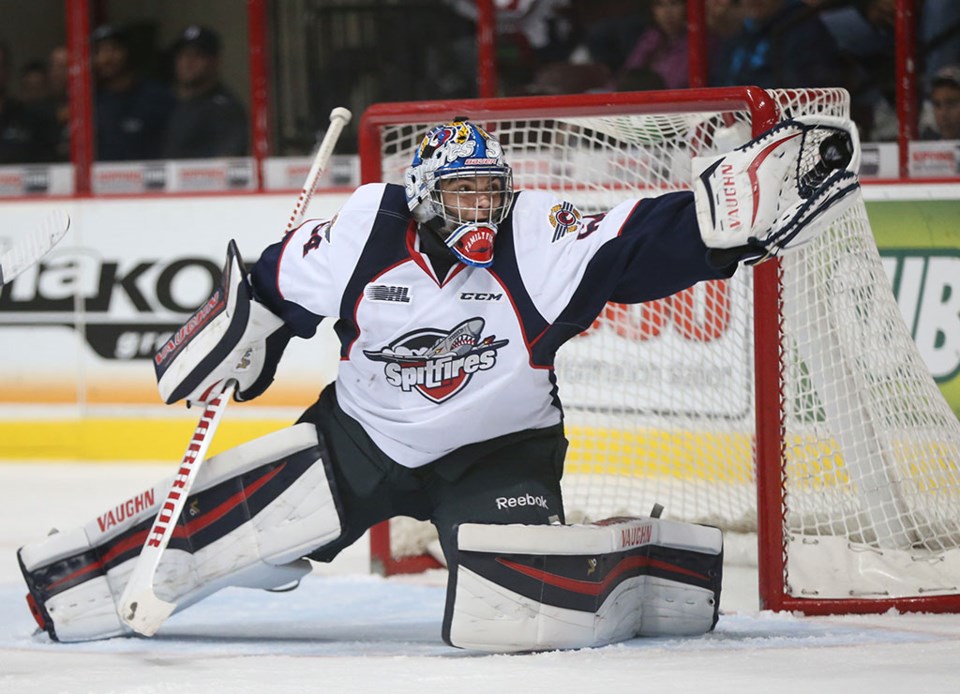Michael DiPietro has never heard about . His eyes go wide as Cloutier’s pugilistic past comes to light and laughs, excited to go check YouTube to see for himself.
“So he was the of goaltending, then?” he asks, which perhaps oversells Cloutier’s abilities a bit, but he’s not far off.
DiPietro is a confident young man, and that confidence connects with Cloutier, who had to be confident in himself as he faced numerous obstacles throughout his NHL career. Both are considered undersized for their position, but DiPietro isn’t shy about preferring his own aggressive, athletic style over the bigger goaltenders who just get in the way of the puck.
“Let’s be honest here,” he says. “Nobody wants to watch a boring hockey game, so why not give them a little excitement?”
The benefit of having someone like Cloutier as a coach is that he’s not going to ask DiPietro to throw out his instincts and try to turn him into a cookie-cutter goaltender. That’s something DiPietro clearly wants to avoid.
“I’m a big believer in the difference between blocking a save and actually making a save,” he says. “Sometimes you have to be athletic, sometimes you have to throw the book aside and not be the perfect goalie, you just have to do whatever it takes to stop the puck.”
The key is knowing that even those athletic, desperation saves can be aided by the technical side of the game. It’s a lot easier to recover to make a diving save on a rebound when you track the puck properly and have a fine-tuned recovery technique. Even a small technical issue can delay that recovery and mean the difference between a show-stopping save that brings the crowd out of their seats and a goal against.
“You can be athletic at times,” says DiPietro, “but sometimes you have to dial it back, so you don’t have to sprawl out every second save, you can push to it, be square, and not immediately go into desperation mode. I think the technical side of the game can definitely polish up those athletic saves I make, but it doesn’t limit them.”
Now Cloutier is partly responsible for taming DiPietro’s wilder tendencies in net and give hima solid technical foundation. His NHL past and personable style help when working with DiPietro.
“Dan’s a goaltending coach that you can relate to on a personal basis,” says DiPietro. “He understand what kind of goaltender I am and we use my strengths to my advantage. Working with him has definitely opened my eyes to different avenues I can explore with save selections.”
“He’s very competitive and so am I,” he continues. “He’s a battler and so am I. That’s my game, that’s my strong point. It makes us close, we can form a relationship, a friendship, because we understand each other.”
DiPietro has a big goal for the coming season: make the Canadian World Junior team. He’ll face stiff competition for the role, such as his Canada U-18 teammate Ian Scott, a fourth-round draft pick of the Toronto Maple Leafs. Scott is the bigger goaltender, but for DiPietro, it’s not about the size, it’s about the eyes.
“Your eyes are the most important part of goaltending,” he says. “If you can see it, you can stop it. Having the ability to read not only on the puck coming in to you, but off of you too. I think when you track it, it makes you faster, because you know exactly what angle you have to push on, what depth you have to get to in net.”
DiPietro believes that once he polishes the technical side of his game, his athleticism will carry him to where he wants to go in his career. His confidence is undeniable. Even when Kevin Woodley of InGoal Magazine dropped his phone while interviewing him and he was chastised for not making the save, he had a quick and confident retort:
“It was going wide. I had the angle.”
Ěý



